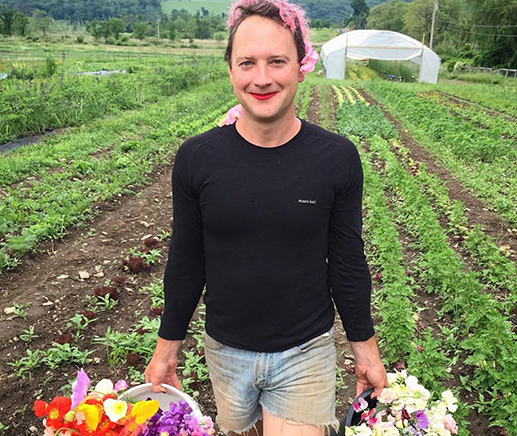“We do pronoun checks with anyone that comes onto the farm – it’s important for our trans and non-binary community and just one of the many things that creates a safe space for everyone,” says Maggie Cheney, founder and co-owner of Rock Steady Farm and Flowers in upstate New York, the only farm of its kind in the US. “We’re a mission-based commercial farm, a women- and queer-owned co-op, rooted in social justice, growing specialty cut flowers and sustainable vegetables,” she explains.
But what has sexuality got to do with food? Cheney explains that in the States, 98 per cent of farms are considered family-run businesses: “That’s essentially a white man in power running the farm and a woman inside doing the books – there’s nothing wrong with that but we’re trying to push that assumption.” Growing up as a farmer’s daughter, this stereotype troubled her for 35 years. “I bounced back and forth between urban and rural – sometimes if I tried to be out I felt unsafe in rural spaces but in cities I missed nature.”
Now, Rock Steady’s tailor-made community programmes aim to “improve food access, rights and ability” through food vouchers and a veg box scheme with a sliding payment scale. The health of the queer community is a priority too, Cheney explains: “A high percentage of LGBTQ+ people are food insecure and might have diet-related illnesses.” They also work closely with HIV patients in NYC with diet-related illnesses who have an interest in eating healthy food.

In 2018, Lincolnshire-based Matthew Naylor founded AgRespect, a platform to share empowering stories of LGBTQ+ people in the global farming community in response to media attention about gay farmers increasingly being tied to mental health difficulties. “For me, visibility is key. It’s not a problem to be out, we just need to change perceptions. It’s infuriating that so many advertisers and press outlets reinforce the stereotype of a tall, white, middle class man on a tractor,” explains Naylor, who last year celebrated Brighton Pride with 50 members of the LGBTQ+ farming community alongside a rainbow-painted tractor.
“We need inventive, new ideas in the food and farming systems, so we need to welcome diversity in this industry. It’s about acceptance, curiosity and understanding how best to support someone who brings something different to the mix.”

Social injustice may well be amplified in the countryside due to geographical isolation and Dee Woods, coordinating group member at union Landworkers’ Alliance, believes we have a long way to go in terms of changing attitudes and policy. “In wider society, we’re unequal and there’s a general perception that people of colour or people with any difference don’t belong. That tends to be a barrier,” says Woods, who is introducing an online space within Landworkers’ Alliance to give a voice to the BIPoC (black, indigenous and people of colour) community.
“Within urban agriculture, we are driven by social justice, equality and food access so there’s a better understanding in cities but there’s still latent racism there,” she explains.
Back in New York State, on 80 acres of land an hour from Rock Steady, Leah Penniman runs a regenerative farm alongside a non-profit educational institution training black and indigenous farmers. “We integrate our commitment to social justice into the farm’s everyday operations, primarily through food access,” says Penniman, who was inspired to found Soul Fire Farm after moving to a low income neighbourhood in Albany with a history of housing segregation and oppressive racist policies.

“At first, many thought we were brown and strange but now after a decade, people ask us how to improve their top soil and we’re engaging with the community,” says Penniman, a Black Kreyol farmer, food justice activist and author of Farming While Black: Soul Fire Farm’s Practical Guide to Liberation on the land.
“We’re building relationships with people who otherwise wouldn’t think that organic food is for them and we organise for neighbours to pay for fresh fruit and veg as a welcome gift to new refugees or immigrants as well as anyone who is coming home from being locked up,” says Penniman, who has created an online reparations map through which 30 individuals and co-ops have already received substantial funding.
“Folks of colour put on their projects and ask for what they need, whether that be a tractor, technical assistance, five acres of land, and people of good heart and wealth can contribute directly.”
“We’re calling life back into the soil through afro-indigenous farming – we’re sucking carbon out of the atmosphere and putting it back into the soil where it belongs,” adds Penniman. “We see the land as our teacher, our guide and our boss.”
And just as biodiversity in nature is vital, so too is a vibrant mix in the farming communities that steward our environment.












0 Comments